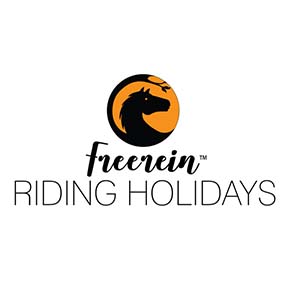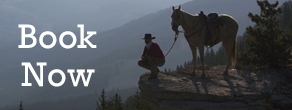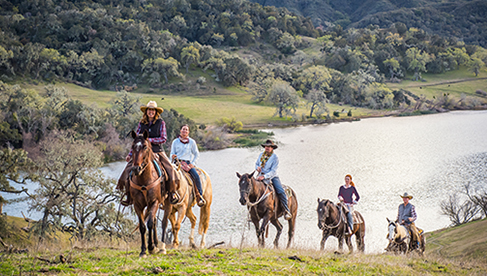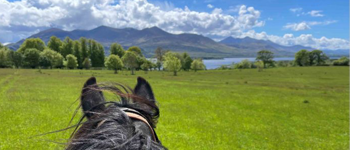France- Discovering Provence on Horseback

By Judie Framan
photos by Elliot Framan
In the hills that link the Mediterranean Sea to the snow-capped Alps lies the heart of Provence. Sometimes called a bridge between the past and present, Provence is a quiet land of sloping vineyards, cultivated farms, colorful scenery, olive groves and lavender fields. This is the land that charmed Van Gogh, Cezanne, and other prominent Impressionist artists searching for "a different light."
Our adventure began by flying into Paris where we stayed the night. The next day, we left the hustle and bustle of Paris and rode the bullet train (125-mph nonstop) south to Aix-en-Provence. The town was founded in 122 BC, and was the first Roman military outpost. Today it is a city of 150,000 people whose celebrated son, Paul Cezanne, immortalized the countryside on canvas. We drove from Aix-en-Provence to Les Cypres de L'Etang in the heart of Provence where our riding adventure was to begin. Les Cypres de L'Etang is a provincial 18th Century Bastide Country Inn set in the hills outside of the medieval village of Sillans-la-Cascade. We were to spend several days on horseback discovering forests of old oaks, fields of olive trees and sunflowers, vineyards, lakes, and hills, which gave us magnificent views across the splendid landscape that is Provence.
On arriving at Les Cypres, we met our host, Jean Bernard Martin, who welcomed us in a gracious and hospitable manner and gave us a tour of the Inn and grounds. We were overwhelmed with the peace and silence of the place. Les Cypres is a renovated Provencal country house completely surrounded on three sides by forest. It sits on a rise overlooking the swimming pool, grassy meadows where the horses live, and a large pond. The delight and elegance of Les Cypres de L'Etang is in the bedrooms, each with its own character and name. Old stones and tiles from the famous nearby tile making town of Salernes were used to create the ambiance, serenity and authenticity in the comfortable; beautifully decorated rooms. We stayed in the Provence suite, which was appointed with the colors of the sun. Our private bathroom had a Mediterranean motif and was decorated with handmade tiles from the noted tile maker Pierre Basset. A pathway leads from the guest accommodations to the common room, an 18th century arched room that has been completely restored into an exquisitely appointed salon and dining room.
Soon we were touring the pastures to meet each of Jean Bernard's horses. The herd is made up of Andalusian and Andalusian crosses, plus some retired French trotting racehorses. I was struck by their gentle friendly manner. During our riding adventures, I was paired with two different horses, Chico, a 16-hand Andalusian with a kind liquid eye and easy manner, and Rio Bravo, a magnificent 17-hand French trotter who was Jean Bernard's personal horse.
Jean Bernard shares several passions with his guests, including quality horses, fine wine, and incredible Provencal cooking. The elegant accommodations of the Inn were but a showcase for his horses and the culinary delights. His obsessions appeal to the interest of those who appreciate the dilemma of the chicken and the egg. Or in this case, do we ride to eat or do we eat to ride?
Each day begins with a French buffet breakfast of homemade jam, warm croissants and baguettes, coffee and juice. On our first riding adventure, we explored the hills and valleys around the area near Les Cypres. On this adventure, I rode Chico. Riding him at all gaits was like sitting in a rocking chair. On his back, I was transformed into a medieval princess, riding her trusted palfrey through the countryside. We rode through woods of centuries-old oak (two species, green and white), and near the tiny village of Sillans-Ia-Cascade, passing the castle of the Counts de Castellane. We passed the ramparts with their towers and 11th century battlements, truly a treat for medieval history fanatics. The village has kept its special medieval look that resembles a large farm with a central courtyard.
On a signal from Franck, our horsemaster, we cantered over a grassy meadow that led us to the Cascade, a 40-meter waterfall that plummeted into the swirling waters of the little lake below, the most romantic and memorable part of the trip. It is formed by the waters of the river Bresque, joined by those of the source of the castle Brese and the valley of Ourc.
Possibly sensing my excitement, Chico burst into a smooth-as-glass rolling canter, and soon we outpaced the rest of the group. We dismounted, tied up the horses and walked the rest of the way to the base of the majestic waterfall. The sun reflected off the water like diamonds falling from the sky. On the way home, we continued our ride through the beautiful hillside forest on pretty trails with glorious scenery all around. We looked hard at the base of the oaks in hopes of finding precious truffles to take home for dinner, but we weren't lucky. Later we met up with local hunters who were looking for the wild boar that are plentiful in the forests. We rode past the tiny chapel Chapelle Saint Laurent near Sillans-Ia-Cascade, crossed the river over a small sturdy Roman bridge and arrived back at the Inn.
The cuisine of the Provence region is exceptional. Whether we were experiencing a four course table d'hote created by Jean Bernard, or experiencing the culture and atmosphere of Provence in one of the local restaurants, the food was impressive.
That evening Jean Bernard recommended a small bistro in Salernes, Les Temps des Mets, a quaint family operation that boasted house specials of local cuisine including melt-in-your mouth Charolais beef and perfectly roasted canard (duck) as entrees. For starters we dined on smoked salmon, a marvelous plate of escargot, scallops in butter, and scallop pate with avocado puree and lemon butter sauce. An elegant Grand Marnier souffle and Creme Brulee finished the meal. Of course all this was accompanied by fine red wines of the region.
Les Cypres is only one year old, but the attention to detail is already de rigueur. Jean Bernard says that he is a perfectionist and pays attention to details so that he can make Les Cypres de L'Etang one of the most pleasant places in the world for a horseback riding holiday. He does not accompany his guests on the horse treks but we were in good hands with a local horseman, Franck, who is a certified equestrian tourism guide (Accompagnateur de Tourisme Equestre). Franck is an exceptional horsemaster and was always eager to accommodate.
Fanatical attention to detail is the watchword for the horse facility. It begins with a well-kept stable yard, immaculately kept tack room, and a regime of horse care that is second to none. Each rider is interviewed upon arrival as to their skill level, and then paired with the appropriate horse. At the start of each day's ride, the riders fetch the grooming kits that hang neatly on a hook above polished tack belonging to each horse. The horses are groomed by the riders under the watchful eye of Franck, and then saddled up. With girths loose and stirrups elevated, the horses are walked to the mounting area, which is under a large stand of oaks. After final adjustments, the riders mount and head off for the days adventure.
Our second day's ride took us to the tiny medieval village of Fox-Amphoux, nestled in superb forests of pine and oak. To reach our destination, we rode though picturesque villages along forest trails, up hills and down. Crossing a valley with fertile fields, Franck asked if we wanted to canter. This time I was paired with Rio Bravo, who's bold reaching trot went on forever while everyone else was cantering to keep up. I can safely say that there is nothing quite like riding one of these horses. We slowed to a walk and rode through a vineyard, grape leaves strewn along the path like so much crushed gold foil, crackling beneath the horse's feet.
We climbed up hills and down the other side, slowing to a walk because the footing was quite rocky. The horses picked their way along without a misstep. Finally we reached our destination, Fox Amphoux, a tiny village set on a low hill at the crossroads of two Roman roads. Agriculture is the main livelihood, and vineyards, fields, and farmland fill the countryside surrounding the village. The village has preserved the ruins of the ramparts and the Chateau des Blacas, which was built in 1200 AD. Clattering along the picturesque cobblestone streets, as narrow as one car width, we admired the neat-as-a-pin 16th and 17th century gray stone houses, with brightly painted shutters, awash with color- blue, orange, yellow, lavender. Pots of flowers perched on windowsills, a riot of color against the gray stone.
The small square was very shady, and a centuries-old nettle tree stands at the end of the square in front of the church. The buildings were a mixture of ruins and renovations, all ancient looking. Fox Amphoux is famous as the birthplace of Barras, one of the key figures of the French Revolution, and the directoire and paramour of Josephine before she married Napoleon Bonaparte and became empress of France.
Lunch sounded like a good idea after we left Fox Amphoux. We trotted around a corner following the stream, and were smack in the middle of the Baca de Peleng woods. There we found a picnic area complete with tables that stood under a canopy of oaks and a place for the horses to rest. Les Cypres supplies riders with picnic lunches when on an all day ride. On the way back to the Inn, we rode along the forest trails and found some places to have a nice long canter.
That evening we enjoyed a table d' hotes dinner in the splendid old arched room at Les Cypres. In keeping with his belief that quality meals are part of the art of living, Jean Bernard created a magnificent repast rich in the aromas of Provencal cooking. Local goats cheese with olive oil and smashed olives were the first course. Velvety yellow squash soup and homemade bread came next. The carre d'agneau (leg of lamb), topped with a sauce of butter, lemon and rosemary, and accompanied by aromatic rice, was succulent and scrumptious. The Provence finish was a glorious bananas flambe, coffee and brandy. Of course, the appropriate wine of the region accompanied each course.
On the horse's day off, guests can enjoy a myriad of fun and relaxing activities. Rent a bike or scooter and explore the local area, picturesque villages, forests, rivers, local restaurants arts and crafts, and of course the Cotes de Provence vineyards. Or rent a car and driver for the day and explore more far reaching vistas. Catch the open air farmer's market in the nearby town of Aups. Golf and tennis are available locally, and you might even want to rent a canoe and explore the rivers and forests. Or you can just stay under the cypresses and swim in the heated pool at Les Cypres.
As we drove away, I looked back at the magnificent creation that is Les Cypres de L' Etang. I was struck with the thought that the accommodations, which border on elegant are but a showcase for Jean Bernard's true passions - his horses, his food, and the fine wine of the region. He has created this place to share those passions with his guests. I began to think that good food, fine wine, and horses may well be the definition of Provence.
How you can go: Learn about riding vacations in Provence, France.




